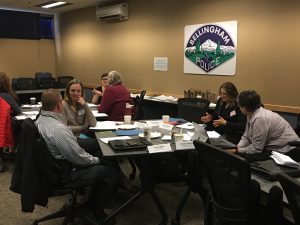Change Seeker: Making Institutions Work for People
E-Newsletter for Analyzing Institutional Responses to Violence Against Women

Issue 3
Praxis training and technical assistance on institutional analysis provides tools for advocates and communities to reform the social institutions that respond to victims of violence against women. Change Seeker: Making Institutions Work for People is a bi-annual e-newsletter that features foundations of Institutional Analysis, recent projects, new tools, answers to TA questions, upcoming training events, and interesting applications of Institutional Analysis. We hope it helps you to succeed in your system reform efforts!
Quick links:
Community Spotlight: Bellingham-Whatcom County and Praxis Team-Up to Conduct a Sexual Assault Audit
Dear Praxis: Observations of Front-Line Practitioners
Featured Tools: Resources to Support Text Analysis
Distinctive applications
Upcoming TA & training
Community spotlight: Bellingham-Whatcom County, WA and Praxis Team-Up to Conduct a Demonstration Sexual Assault Audit 
“We had a focus group survivor who talked about her dog having surgery. She couldn’t believe that the vet’s office called a few days afterwards to see how the dog was doing. She was like ‘Geez, I reported being raped and no one called me later to find out how I was doing, you know?’” – Audit coordinator
This story was shared with the interagency team pulled together in Bellingham-Whatcom County, WA to conduct a Safety and Accountability Audit of their local response to sexual assault – and local practitioners were highly motivated to make changes. The forensic nurse coordinator on the team proposed a plan for the hospital to contact adult survivors after a sexual assault exam to see how they are doing and to further make referrals to victim advocacy and other agencies.
But this story isn’t unique to Bellingham. Adult survivors of sexual assault across the country are reporting unsatisfactory experiences with medical and criminal legal responses. Increasingly, communities like Bellingham-Whatcom County are turning to the Praxis Safety and Accountability Audit (Audit) process and tools to figure out how this comes about: how are missed opportunities for justice and accountability in sexual assault cases produced by the ways sexual assault “cases” are processed (read about other examples of immediate, short-, and long-term changes that communities have reported from their experiences using the Audit to improve their responses to crimes of violence against women).
While the Praxis Audit process can be tailored to any system or social problem, many of our existing tools were initially developed from our experience with Audits of criminal case processing of domestic assault crimes. Since 2005, eight sexual assault-focused Audits have been completed and Praxis has responded to many more communities that are looking to the Audit to improve their response to sexual assault. In 2015, Praxis sought and received funding from the Office on Violence Against Women (OVW) to conduct a demonstration to identify the fundamental distinctions of conducting Audits that focus on sexual assault crimes. We will also identify new tools, materials, and resources to support more communities to do this on their own.
 This summer, we established a team of national experts – on Audits, sexual assault criminal case processing, and sexual assault against Native women – and are partnering with a local team of practitioners in Bellingham-Whatcom County to put our tools to the test. This community was an ideal partner since they also received funding from OVW to conduct an Audit focused on how their community is meeting the justice needs of young adult and Native sexual assault survivors. Their local team is made up of representatives from the Lummi Nation, local community colleges, universities, and hospital, as well as core criminal legal system practitioners.
This summer, we established a team of national experts – on Audits, sexual assault criminal case processing, and sexual assault against Native women – and are partnering with a local team of practitioners in Bellingham-Whatcom County to put our tools to the test. This community was an ideal partner since they also received funding from OVW to conduct an Audit focused on how their community is meeting the justice needs of young adult and Native sexual assault survivors. Their local team is made up of representatives from the Lummi Nation, local community colleges, universities, and hospital, as well as core criminal legal system practitioners.
This fall, Praxis staff and the national demonstration Audit team traveled to Bellingham, WA to conduct training on the Audit and to engage in a week of intensive data collection activities – see highlights below:
- Interviews: text-based interview with a sexual assault nurse examiner regarding the use of the sexual assault kit and interviews with Lummi Nation practitioners regarding Bellingham-Whatcom County’s response to Native survivors.
- Observations: emergency rooms and waiting area, court proceedings, police ride-alongs, and an interagency sexual assault case file review team meeting.
- Community consultations: students at local college campuses, forensic nurses and detectives; national audit team members engaged in in-depth planning sessions with the local coordinator for conducting focus groups with Native survivors on an off the nearby reservations of the Lummi Nation and Nooksack Tribe.
- Text analysis: reviews of law enforcement investigation reports with subsets of the local and national audit team.
While much was accomplished during our Audit intensive week in November, the Audit team is now refining their Audit scope and focus and gathering more data around issues shared with communities across the country: evidence collection, response involving a known perpetrator, victim engagement, institutionally-derived delays in case processing, and response to young adult and Native survivors.
For more information on this community’s experience with the Audit, or for how to apply for funding to conduct an Audit in your community, email info@praxisinternational.org.
National Audit Team
| Local Audit Team Melissa Lacki, Audit Coordinator Western Washington University and Whatcom Community College KPO Counseling, LLC Domestic Violence and Sexual Assault Services St. Joseph Hospital Bellingham Police Department |
The Bellingham-Whatcom County Commission Against Domestic Violence Compass Health Whatcom County Prosecutor’s Office Lummi Nation Victims of Crime Whatcom County Sheriff’s Office |
Dear Praxis: Observations of Front-Line Practitioners 
We provide individual consultation to you as you prepare for, plan, and conduct your community assessment. Email info@praxisinternational.org to learn more.
Dear Praxis,
We are currently involved in the data collection phase of our Safety and Accountability Audit and several team members have shared observations of front-line workers going above and beyond the call of duty. But we’ve also observed front-line workers acting in ways that are not helpful to people or are harmful, biased, or otherwise problematic. How do we handle this as an audit team?
Dear Change Seeker,
The Safety & Accountability Audit (Audit) is designed to focus on how institutions structure work. When we observe average, stellar, or troubling practices, we want to find out which of the 8 primary methods of organizing a practitioner’s job shapes the response. For example, we might ask the following kinds of questions to help understand how the work is structured:
| Mission, purpose and function | Was the visitation center worker’s function to focus exclusively on the safety of the child – regardless of risks to the battered parent? |
| Concepts and theories | What concepts around protective strategies did the child protection worker use when responding to cases involving battered mothers? |
| Education and training | Was the worker trained on how to accurately use the risk assessment protocol? |
| Resources | How readily could the 911 call-taker and dispatcher obtain information about the history of calls for help at a particular address or from the parties involved? |
| Linkages | Did the working relationship between the community-based advocate and the victim-witness specialist play a role in the outcome of the case? |
| Rules and regulations | What policy or protocol was the prosecutor following when developing an evidence-based prosecution strategy? |
| Administrative practices | How did the presentence investigation (PSI) report direct a PSI writer to include or exclude certain information? |
| Systems of accountability | What role did the supervisor play in ensuring sexual assault investigation reports are thorough and focused on the right evidence? |
| To be discovered… | What other things influenced this worker’s response? |
Paying attention to workers who go above and beyond the call of duty lends us insight into what is possible for the response and what might be codified so that all frontline workers are structured to meet that standard. It’s also completely appropriate for the Audit coordinator to share the observation of outstanding efforts to the lead contact within an agency who can then decide whether and how to recognize the frontline worker.
Audit team members may also observe missing or incorrect applications of policy or protocol that could cause further harm for victims and their families. Sometimes Audit team members will see things that cannot wait to be addressed until the report is written and released (for example a 911 call taker disconnects a call and does not use a Language Line when the caller has difficulty communicating in English or a law enforcement officer threatens a victim with not responding next time she calls 911 if she hasn’t left him). If an Audit team member sees a serious issue that raises an immediate safety concern for victims, we need to make sure that somebody knows as soon as possible.
The confidentiality agreement that team members sign at the beginning of the Audit includes the following statement:
In the unlikely circumstance where a member of the Audit team observes a practice that requires immediate attention, either because of threats to a person’s safety or apparent professional misconduct, that team member and the Audit Coordinator will privately communicate their concerns to an appointed designee of the applicable organization.
This guidance is important enough to state regularly…during team training and orientation and in reminder communications as team members go out to conduct interviews and observations. Throughout the Audit, remind team members that, even as they stay focused on the 8 methods, if they see, hear, or read something during data collection activities that troubles them because it affects the immediate well‐being or safety of victims, discuss the concern individually with the Audit coordinator to decide whether it is urgent enough to take it to the leadership of the agency or whether it can wait to be addressed in the Audit recommendations.
It can feel like a delicate balance to encounter harmful or troubling practices as a team member after emphasizing that the Audit is not about individual behavior or about evaluating individual workers. Lean on these essential tools to help strike that balance throughout your Audit:
- Audit attitude: helps us avoid judging and stay engaged in the conversation and in discovering how a worker understands their job and how they are supervised and trained.
- The 8 Methods: help us step away from individual personalities and ask questions that dig into how the institution puts work together in ways that might produce or allow a problematic response to continue, including such problems as allowing individual workers to act in harmful or biased ways.
- The Audit coordinator: as the link between the team and the participating agencies, the Audit coordinator is thus positioned to raise urgent concerns without waiting for a final report of Safety Audit findings.
Sincerely,
Praxis Institutional Analysis Team
 Featured Tools: Resources to Support Text Analysis
Featured Tools: Resources to Support Text Analysis
Case files stand in for or take the place of actual experiences in someone’s life and become a central actor in institutional case processing. Files are the “official record” of what happened in someone’s life, and they are made up of forms, reports, records, checklists, recordings, and transcripts. Review of case files is a crucial component of any assessment of an agency’s response to violence against women. It can readily point us to adjustments in forms and other methods of documentation that can create a ripple effect and lead to improved case outcomes. Below are several key resources to support your local case file review efforts:
- Text Analysis as a Tool for Coordinated Community Response (free downloadable manual)
- Domestic Violence Best Practice Assessment Checklists
- Supporting the Safety of Battered Mothers and Their Children Together: A Guide to Assessing Child Protection Practice in Domestic Violence-Related Cases, see Toolkit 4: Examining Policy and Case Processing
- What Do Sexual Assault Cases Look Like in Our Community? A SART Coordinator’s Guidebook for Case File Review developed by Sexual Violence Justice Institute is a step-by-step guide that leads SART coordinators through the SVJI process of reviewing law enforcement case files involving sexual assault.
- Webinars
- The Official Record of Violence: Strategies for Case File Review, October 2017, with Denise Eng, Maren Woods, Praxis and Jolene Engleking, Sexual Violence Justice Institute@MNCASA
- Learning from Text Analysis: Case files, forms and checklists, March 2016, with Casey McGee and Olga Trujillo
- The Official Record of Violence: Strategies for Case File Review, August 2015, with Casey McGee, Rhonda Martinson, and Olga Trujillo
Email info@praxisinternational.org to learn more.
Distinctive Applications
- Conducting Analysis in Institutional Ethnography Analytical Work Prior to Commencing Data Collection, Janet Rankin, Faculty of Nursing, University of Calgary, Alberta, Canada
- Accounting for Culture in Supervised Visitation Practices, Chicago, IL
- How are the child welfare system and its partners equipped to access and meet the needs faced by African American Families in their initial months of involvement with the system? Linn County, Iowa
- How is the safety and wellbeing of victims of domestic violence and their children addressed and promoted in the process of resolving child custody matters in Winona County, MN?
[February 2018]

